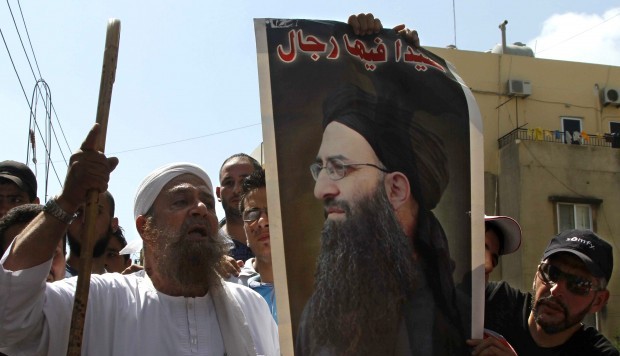
Lebanese protesters hold a poster of hard-line Sunni cleric Sheik Ahmad al-Assir with the Arabic reading, “There are men in Sidon. Anytime you call us we will respond” during protests on June 28, 2013. (AP Photo/Mohammed Zaatari).
Beirut, Asharq Al-Awsat—Several thousand supporters of Sheikh Ahmed Al-Assir took to the streets of Sidon, Tripoli, Beqaa and Beirut on Friday in solidarity with the Sunni cleric whose whereabouts remain unknown. Assir fled his base in Sidon after Lebanese military forces stormed his headquarters capturing dozens of his aides on Monday.
Sunni preachers condemned the arrests of Assir’s supporters by the Lebanese government, accusing Beirut of a pro-Hezbollah bias.
After Friday prayer, protestors in Sidon marched toward Assir’s headquarters, currently under the control of the government, in the district of Abra in solidarity with those arrested by the government.
In a preemptive move, the city’s Sunni clerics took the decision during a meeting of the Dar Al-Fatwa [a fatwa issuing body] to hold a mass Friday prayer at Za’tary Mosque, with the remaining Sunni mosques in Sidon closing their doors.
On arriving at Assir’s headquarters, protestors opened fire on a Lebanese army checkpoint, prompting Lebanese soldiers to scatter the protestors by firing into the air, the state-run National News Agency (NNA) said.
Protesters distributed leaflets calling on the government to inform them about where the Suuni Assir supporters were being held.
Sidon’s Mufti, Sheikh Salim Sousan, addressed protestors in front of Za’tary Mosque, demanding a fair and transparent investigation be launched into the recent clashes in Sidon.
In what was interpreted as a positive move, Judge Saqr Saqr, who previously served as government commissioner at military court, visited the Lebanese Army Intelligence Directorate to monitor interrogation procedures with the Assir supporters.
Saqr released 25 of Assir’s supporters on Friday, while 47 others had been released the day before. The remaining 47 Assir supporters remain in the custody of the intelligence directorate.
Meanwhile, Sunni supporters of Assir in Tripoli sought to escalate the situation by vandalizing Lebanese Army memorials erected at the entrance of the city. Unknown gunmen reportedly replaced a poster of Saad Al-Hariri, the former prime minister, with one of Assir, in a move which many interpreted as a call for the emergence of a more radical brand of Sunnism.
Mustafa Alloush, a senior member of the Future Movement, played down the incident. He denied that a portrait of Hariri exists in the city, stressing that the portrait in question was intentionally mounted in order for it to be replaced by an image of Assir on the following day. Alloush branded the move a “fabrication.”
For his part,Syrian-born Salafist preacher Omar Bakri denied that the protests, which occured in several Lebanese cities, were “organized.” He claimed that these represented a “spontaneous reaction by Sunnis in sympathy and support for Sheikh Assir.”
Bakri added that the protests reflected Sunnis’ “sense of resentment” toward the Lebanese military which “sides with one faction against another.”
